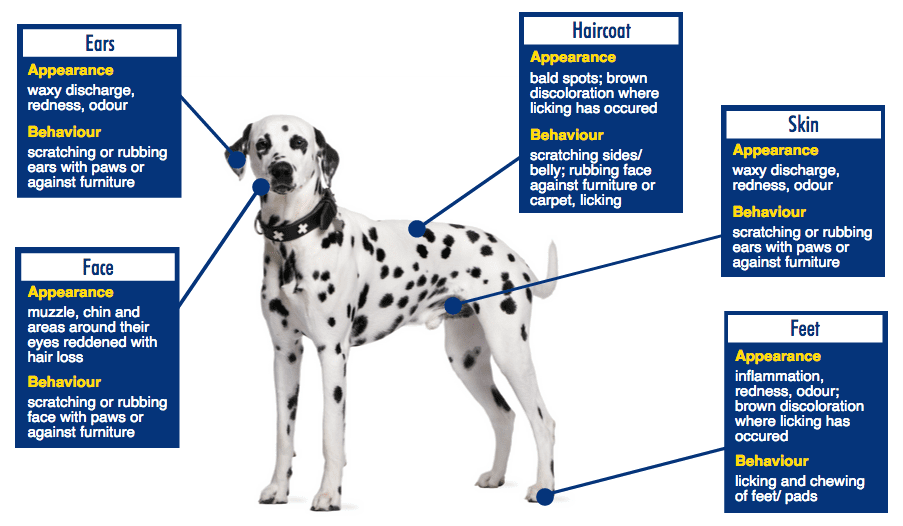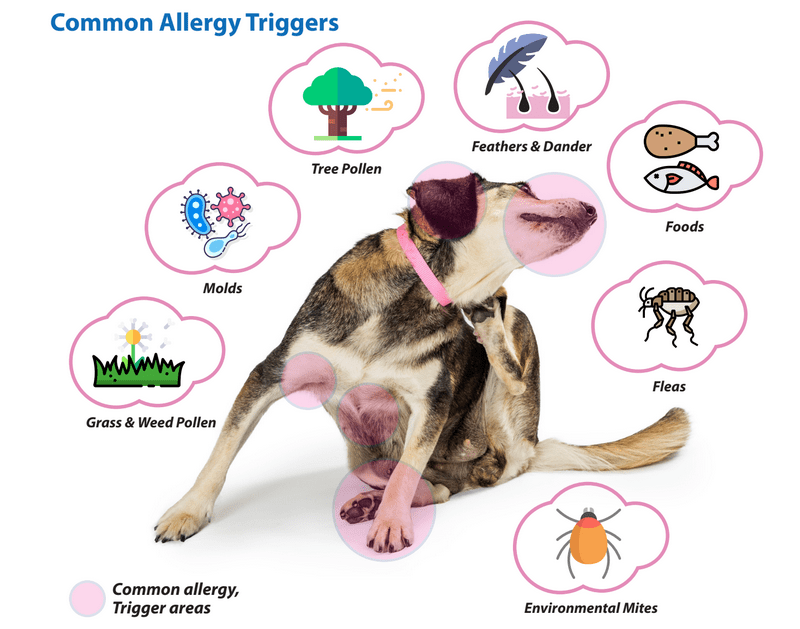Dog allergies encompass more than mere reactions to irritants; they represent complex biological responses that can drastically affect your dog’s health. This guide delves into the nature of canine allergies and offers effective strategies for managing them, enhancing your dog’s life quality.
What is an Allergy in Dogs?
In dogs, an allergy is an intense immune response to what are generally harmless substances, known as allergens. These allergens could be proteins from a variety of sources such as insects, plants, or animals. Typically, it takes several exposures for a dog to become sensitized to an allergen, but once this happens, even minimal contact can trigger severe symptoms.
The Immunological Mechanisms of Allergies
A dog’s allergic reaction involves a complex immune process primarily featuring Immunoglobulin E (IgE) antibodies. These antibodies react by binding to allergens and then to mast cells, which are found throughout the body’s tissues. The engagement of these cells results in the release of inflammatory agents like histamines, which cause symptoms such as swelling, redness, and intense itching.
Recognizing the Symptoms of Dog Allergies
Symptoms of allergies in dogs are diverse and can be grouped into three main categories:
- Dermatological Symptoms: These include itching, redness, and skin irritation.
- Respiratory Symptoms: Symptoms such as sneezing, coughing, and wheezing, along with nasal or eye discharge.
- Digestive Symptoms: Symptoms like vomiting and diarrhea, which are typically signs of food allergies.
How Common are Allergies in Dogs?
Allergies are fairly common in dogs, affecting various breeds and usually becoming apparent after the age of six months. Some allergies are genetic, with atopy being one of the more common inherited forms.
Understanding the Different Types of Allergies in Dogs
Dog allergies can be categorized based on what triggers them:
- Flea Allergy: Mainly triggered by the saliva of fleas.
- Food Allergies: Caused by reactions to specific ingredients, usually proteins.
- Atopy (Inhalant Allergy): Triggered by airborne substances like pollen, dust, and mold.
- Contact Allergy: Caused by direct contact with chemical substances or materials.
Managing Dog Allergies: Treatment Approaches
Treatment strategies for dog allergies vary depending on the allergy type and severity, but generally include:
- Pharmaceutical Treatments: Using antihistamines and corticosteroids to control symptoms.
- Shampoo Therapy: Regularly washing with medicated shampoos to soothe irritated skin.
- Dietary Management: Avoiding allergenic foods and potentially adopting a hypoallergenic diet.
- Environmental Control: Reducing exposure to allergens by modifying the dog’s environment.
- Hyposensitization Therapy: Administering allergy shots to gradually reduce sensitivity to allergens.
Effectively managing dog allergies requires a thorough understanding of the causes, early symptom recognition, and a personalized treatment plan. With the correct strategies, you can reduce your dog’s discomfort and prevent further allergic reactions, helping ensure a healthy, active lifestyle. Always seek advice from a veterinarian to properly diagnose and treat allergies in your dog, ensuring safe and effective care.
Opening Hours
M-Sa: 10am - 7pm
Address
1111 Central Ave., Charlotte, NC 28204
Phone
844 864 3647



